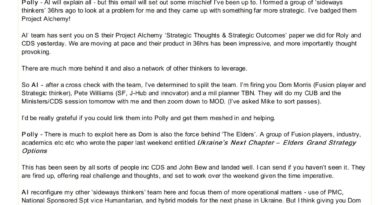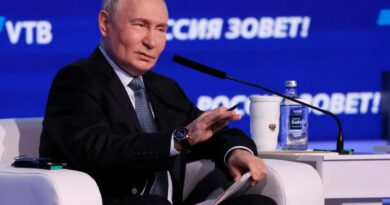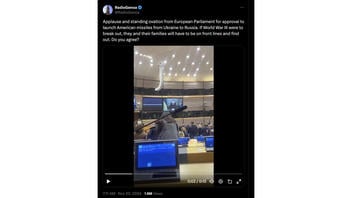Debunking the Trump-backed conspiracy theory on Ukraine election meddling
Washington
CNN
—
Here’s the reality.
In 2016, the Russian government and military, at the direction of President Vladimir Putin, launched an unprecedented attack on the US election. They spent millions of rubles on hackers and trolls who systematically tried to weaken Hillary Clinton and boost Donald Trump. It’s impossible to know if their efforts tipped the scales, but Trump won by a razor-thin margin.
These are the conclusions of the top US intelligence agencies, including the Federal Bureau of Investigation, the Central Intelligence Agency and the National Security Agency. Russia’s role was also confirmed by the Senate Intelligence Committee and the special counsel investigation led by Robert Mueller, who brought criminal charges against Russian hackers and trolls.
But for three years now, Trump has questioned, dismissed and contradicted these findings. He and many of his Republican allies instead adhere to an alternate reality about the 2016 election.
Their story goes like this: It was actually the Ukrainian government that meddled, and it was to help Clinton. In this telling, Ukraine framed Russia for the hacks and coordinated with Democratic operatives in the US to smear Trump. And the US intelligence assessment blaming Russia was written by anti-Trump bureaucrats whose conclusions cannot be trusted.
There is no evidence to support these claims. Ukrainian leaders may have hoped that Trump would lose in 2016, but there was no government operation to influence the US election.
In fact, in a classified briefing this fall, US intelligence officials told senators that Russia engaged in a years-long campaign to push these theories, shifting the blame away from Moscow and onto Ukraine for interfering in the 2016 presidential campaign, according to two US officials familiar with the briefing.
At least nine witnesses in the impeachment inquiry have testified that claims of Ukrainian meddling were fabricated by the Russians or unsupported by the evidence. Others said they weren’t aware of anything to corroborate Trump’s claims. Here’s a breakdown of the testimony.
Former White House adviser Fiona Hill
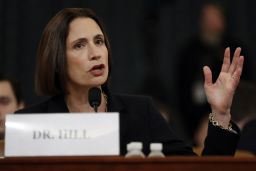
Hill, a leading scholar on Russia, has worked for Democratic and Republican presidents. She was the top Russia expert inside the Trump White House until her departure this summer.
Public hearing, Nov. 21:
“Based on questions and statements I have heard, some of you on this committee appear to believe that Russia and its security services did not conduct a campaign against our country, and that perhaps, somehow, for some reason, Ukraine did. This is a fictional narrative that has been perpetrated and propagated by the Russian security services themselves.”
Public hearing, Nov. 21:
“I refuse to be part of an effort to legitimize an alternate narrative that the Ukrainian government is a U.S. adversary, and that Ukraine, not Russia, attacked us in 2016. These fictions are harmful, even if they’re deployed for purely domestic political purposes.”
Private deposition, Oct. 14:
“The Ukrainian government did not interfere in the US election. The Ukrainian government did not do that. The Ukrainian special services also did not interfere in our election.”
Former Ambassador Marie Yovanovitch
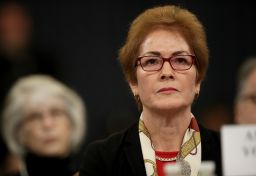
Yovanovitch, a career foreign service officer, was the US ambassador to Ukraine from 2016 until this year, when she was abruptly recalled at Trump’s direction.
Public hearing, Nov. 15:
DEMOCRATIC STAFF LAWYER DANIEL GOLDMAN: Now are you familiar with these allegations of Ukrainian interference in the 2016 election?
YOVANOVITCH: I mean, there have been rumors out there about things like that, but you know, there was nothing hard, at least nothing that I was aware of.
GOLDMAN: There was nothing based in fact to support these allegations?
YOVANOVITCH: Yes.
Private deposition, Oct. 11:
“My understanding, again, from the press was that, you know, the allegation that there was Ukrainian interference in our elections in 2016 – that it wasn’t Russia, it was Ukraine – that that had been debunked long ago.”
White House aide Lt. Col. Alexander Vindman
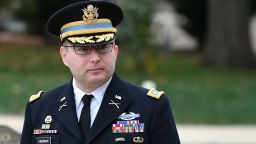
Lt. Col. Alexander Vindman is the top Ukraine expert on the White House’s National Security Council. He is the son of Ukrainian immigrants and earned a purple heart in the Iraq War.
Public hearing, Nov. 19:
GOLDMAN: Now, at the time of this July 25th call, Colonel Vindman, were you aware of a theory that Ukraine had intervened or interfered in the 2016 U.S. Election?
VINDMAN: I was.
GOLDMAN: Are you aware of any credible evidence to support this theory?
VINDMAN: I am not.
GOLDMAN: Are you also aware that Vladimir Putin had promoted this theory of Ukrainian interference in the 2016 election?
VINDMAN: I am well aware of that fact.
GOLDMAN: And ultimately, which country did U.S. Intelligence services determine to have interfered in the 2016 election?
VINDMAN: It is the consensus of the entire intelligence community that the Russians interfered in the U.S. Elections in 2016.
Public hearing, Nov. 19:
REP. JOAQUIN CASTRO: Colonel Vindman, are you aware of any evidence to support the theory that the Ukrainian government interfered in the 2016 election?
VINDMAN: Congressman, I am not. And furthermore, I would say that this is a Russian narrative that President Putin has promoted.
CASTRO: And are you aware of any part of the U.S. government, its foreign policy, or intelligence apparatus that supports that theory?
VINDMAN: No, I am not aware of.
Private deposition, Oct. 29:
GOLDMAN: And are you aware of any factual basis for that narrative, based on your training, experience, and knowledge of Ukraine?
VINDMAN: I am unaware of any factual basis for the accusations against Ambassador Yovanovitch, and I am, frankly, unaware of any authoritative basis for Ukrainian interference in 2016 elections, based on my knowledge.
Deputy Assistant Secretary of State George Kent
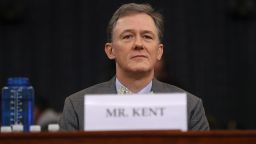
Kent is the deputy assistant Secretary of State overseeing Ukraine policy. He is a career foreign service officer who once served as a top diplomat at the US embassy in Kiev.
Public hearing, Nov. 13:
GOLDMAN: And to your knowledge, is there any factual basis to support the allegation that Ukraine interfered in the 2016 election?
KENT: To my knowledge, there is no factual basis, no.
GOLDMAN: And in fact, who did interfere in the 2016 election?
KENT: I think it’s amply clear that Russian interference was at the heart of the interference in the 2016 election cycle.
Former US Special Envoy for Ukraine Kurt Volker
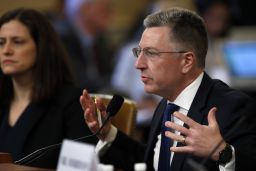
Kurt Volker was the Trump administration’s special envoy for Ukraine negotiations from 2017 until his resignation in September. He previously held several roles in the State Department.
Private deposition, Oct. 3:
“‘Get to the bottom of what happened in 2016’ is a reference to the (Ukrainian) prosecutor general’s claims that there was interference. That to be investigated I always thought was fine, because that is just a matter of, you know, we don’t want anybody interfering in our elections, and did it happen? And my belief was that it didn’t.”
Public hearing, Nov. 19:
“My view was, well if there are things like that, then why not investigate them. I don’t believe that there is anything to them. If there is, 2016 election interference is what I was thinking of, we would want to know about that, but I didn’t really believe there was anything there to begin with.”
Senior US diplomat Bill Taylor
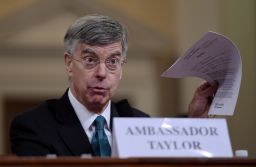
Taylor is the top US diplomat in Ukraine, and took over after Yovanovitch was ousted. He held the title of ambassador during the Bush administration. He is a career foreign service officer.
Private deposition, Oct. 22:
REPUBLICAN STAFF LAWYER STEVE CASTOR: What do you know about attempts of the Ukrainian Government of Ukrainians to intervene in the 2016 election?
TAYLOR: Mr. Castor, I don’t know about those attempts.
State Department official David Holmes
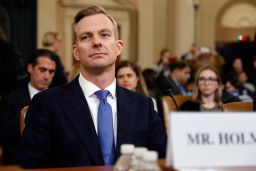
David Holmes is a top official at the US embassy in Kiev, where he is an expert on Ukrainian politics and policy. He is a career foreign service officer who previously worked in Russia.
Private deposition, Nov. 15:
DEMOCRATIC STAFF LAWYER DANIEL NOBLE: And did it also include the investigation of the purported Ukrainian interference in the 2016 US election?
HOLMES: Yes, sir.
NOBLE: Okay. Do you know whether there was any factual basis for either of those allegations?
HOLMES: I’m not aware of any factual basis for either one.
Ambassador to the EU Gordon Sondland
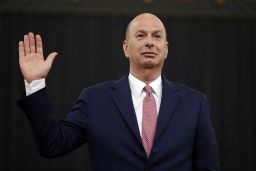
Gordon Sondland is the US Ambassador to the European Union, and handled Ukraine issues at Trump’s direction. He is a political appointee who donated $1 million to Trump’s inauguration.
Private deposition, Oct. 17:
GOLDMAN: Are you aware of any evidence that Ukraine was involved in any way in the 2016 election?
SONDLAND: I have no independent basis to know that, no.
Undersecretary of State David Hale
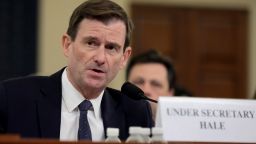
David Hale is the Undersecretary of State for Political Affairs. He is a career foreign service officer who was tapped for the post in 2018. He previously served as a US ambassador.
Private deposition, Nov. 6:
DEMOCRATIC STAFF LAWYER DANIEL GOLDMAN: Within the State Department, as far as you knew was there – were you informed or were you notified or were you provided any factual basis to support the allegations related to the Biden-Burisma allegations and the Ukrainian interference in the 2016 election?
HALE: No. I never saw any evidence of that.
